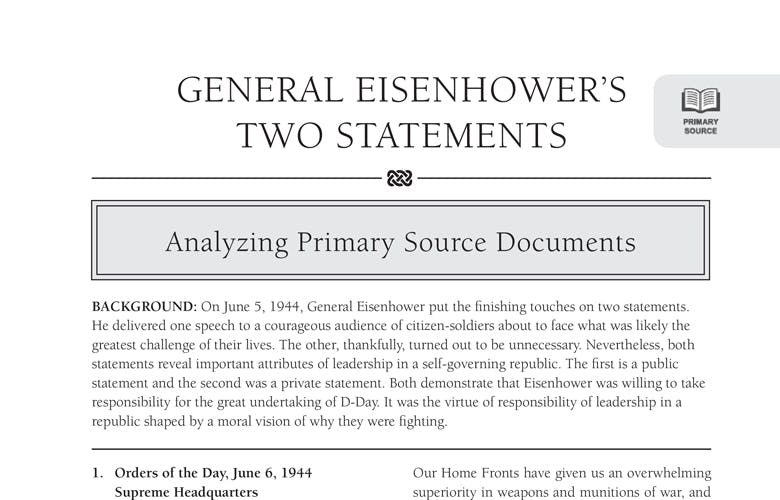General Eisenhower’s Two Statements
BACKGROUND: On June 5, 1944, General Eisenhower put the finishing touches on two statements. He delivered one speech to a courageous audience of citizen-soldiers about to face what was likely the greatest challenge of their lives. The other, thankfully, turned out to be unnecessary. Nevertheless, both statements reveal important attributes of leadership in a self-governing republic. The first is a public statement and the second was a private statement. Both demonstrate that Eisenhower was willing to take responsibility for the great undertaking of D-Day. It was the virtue of responsibility of leadership in a republic shaped by a moral vision of why they were fighting.
Orders of the Day, June 6, 1944
Supreme Headquarters Allied Expeditionary Force
Soldiers, Sailors and Airmen of the Allied Expeditionary Force!
You are about to embark on the Great Crusade, toward which we have striven these many months. The eyes of the world are upon you. The hopes and prayers of liberty-loving people everywhere march with you. In company with our brave Allies and brothers-in-arms on other Fronts, you will bring about the destruction of the German war machine, the elimination of Nazi tyranny over the oppressed peoples of Europe, and security for ourselves in a free world.
Your task will not be an easy one. Your enemy is well trained, well equipped and battle-hardened. He will fight savagely.
But this is the year 1944! Much has happened since the Nazi triumphs of 1940-41. The United Nations have inflicted upon the Germans great defeats, in open battle, man-to-man. Our air offensive has seriously reduced their strength in the air and their capacity to wage war on the ground.
Our Home Fronts have given us an overwhelming superiority in weapons and munitions of war, and placed at our disposal great reserves of trained fighting men. The tide has turned! The free men of the world are marching together to Victory!
I have full confidence in your courage, devotion to duty and skill in battle. We will accept nothing less than full Victory!
Good luck! And let us all beseech the blessing of Almighty God upon this great and noble undertaking.
DWIGHT D. EISENHOWER
“In Case of Failure” Letter
“Our landings in the Cherbourg-Havre area have failed to gain a satisfactory foothold and I have withdrawn the troops. My decision to attack at this time and place was based upon the best information available. The troops, the air and the Navy did all that Bravery and devotion to duty could do. If any blame or fault attaches to the attempt it is mine alone.”
JUNE 5
Directions: Discuss the following questions with your partner(s).
- Orders of the Day June 6, 1944
- In the speech he delivered to the members of the Allied Expeditionary Force, what reasons for confidence did Eisenhower express? Why is it important for a leader in a self-governing republic to express confidence in those he leads and a moral vision of the purposes of their fighting ?
- What, if anything, surprises you about this speech?
- “In Case of Failure” Letter
How does the “In Case of Failure” Letter help demonstrate Eisenhower’s commitment to responsibility in a self-governing republic? - What similarities and differences do you note between the two letters?
